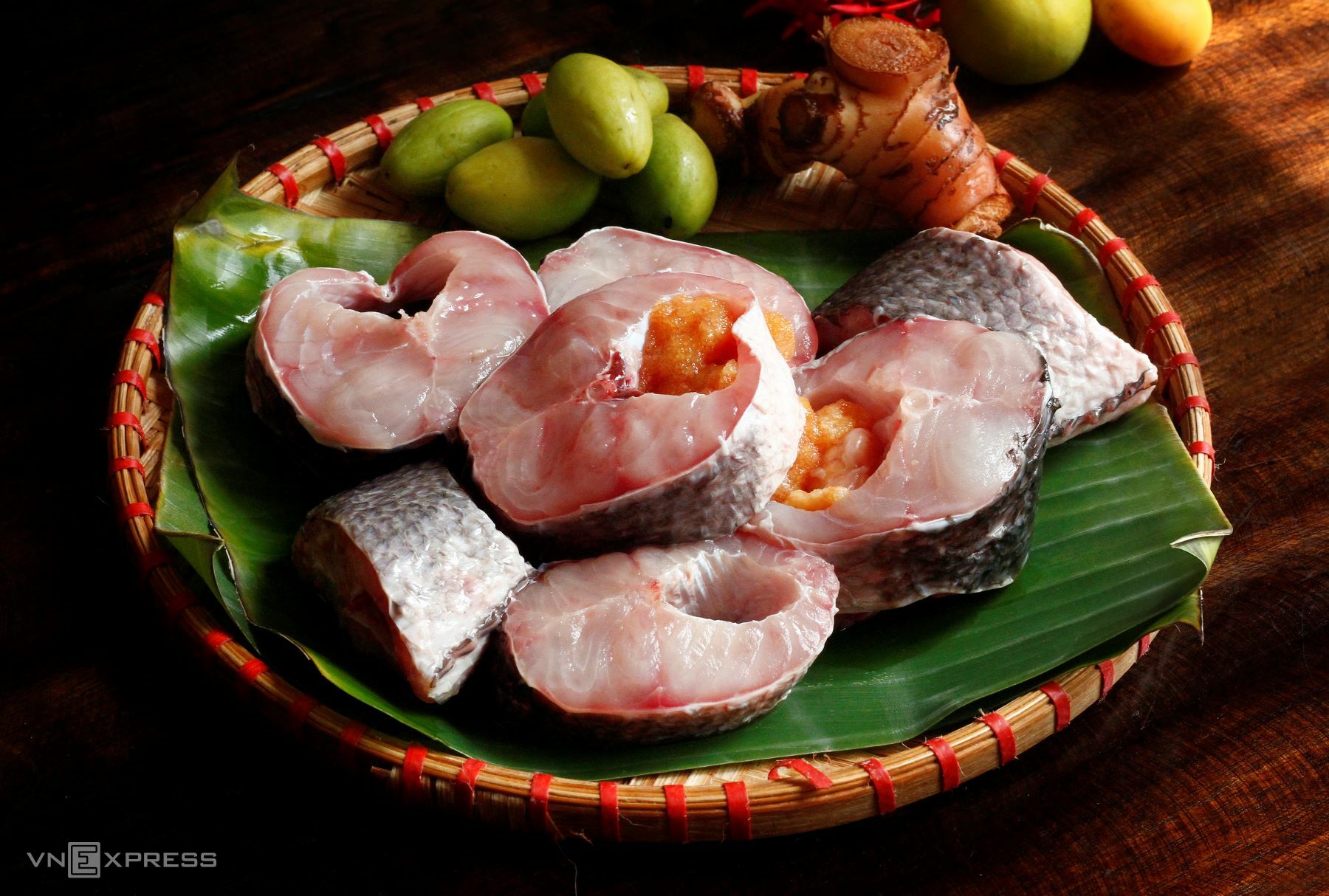Improper preliminary processing
The fishy smell in seafood comes from amino acid compounds like trimethylamine and aldehydes, formed during protein decomposition. These compounds are concentrated in the blood, the black membrane lining the fish's belly, fish bile, shrimp veins, and internal organs such as the liver and intestines.
If these parts aren't cleaned thoroughly during preparation, no matter how long the food is boiled or cooked, the fishy smell won't disappear. In fact, it might even intensify as the heat causes these molecules to evaporate more quickly.
 |
Fish needs to be thoroughly cleaned to minimize the fishy smell. Photo: Bui Thuy |
Fish needs to be thoroughly cleaned to minimize the fishy smell. Photo: Bui Thuy
For a delicious dish, it's crucial to address the source of the fishy smell. With fish, scrape off the blood in the gills and remove the black membrane in the belly. For smooth-skinned fish like catfish and basa, the fishy smell primarily comes from the slime, which contains many amine compounds and bacteria. Therefore, scrub the slime off with salt, vinegar, lemon, or kitchen ash, then rinse with boiling water to effectively deodorize and firm up the flesh.
Internal organs should be rubbed with salt or crushed ginger and quickly blanched in boiling water with ginger. When preparing liver, score it and soak it in fresh milk or salt water to remove excess blood. For shrimp, remove the back vein.
Incorrect cooking temperature and time
Controlling the temperature and cooking time appropriately for each dish is also essential.
Steamed fish is best when the flesh is firm, opaque white, and not flaking. At this point, the fishy smell is naturally eliminated due to the stable coagulation of proteins.
When adding water to fish soups or stews, use hot water to prevent a fishy smell. Pork intestines will become tough and smelly if boiled for too long. A folk tip is to boil small intestines for a few minutes, then remove and soak them in cold water to make them white and crispy without the smell. Boiling pork liver for too long makes the surface dull gray, the inside dry and hard, and the smell stronger.
Skilled cooks don't eliminate smells by prolonged cooking, but rather by cooking to the right degree. They emphasize precision in timing and heat level to preserve the full flavor, texture, and balance of the dish.
Lack of balancing flavors
Even with thorough cleaning and correct cooking temperatures, a dish can still smell fishy if it lacks balancing ingredients.
In Eastern cuisine, ingredients prone to fishy smells, such as seafood and offal, are often considered "cooling" or "yin," which can lead to stomach upset if not eaten correctly. If "warming" or "yang" spices (associated with fire and wood) aren't incorporated during cooking, the dish will have an imbalance, making it prone to fishy smells, indigestion, and even stomach chills. This is why ginger, peppercorns, white wine, onions, lemongrass, chili, and turmeric are traditionally used in dishes with potentially fishy ingredients, not just to mask the smell but also to balance yin and yang.
The solution is to combine spices that balance yin and yang, appropriate for the dish. Fish dishes (braised, steamed, grilled) often include "hot" spices like ginger, turmeric, galangal, dill, and dried onions. Offal should be boiled with a little onion and ginger. Steamed or boiled squid can be cooked with lemongrass and ginger, or in some regions, with lolot leaves or guava leaves. Balut (fertilized duck egg) is incomplete without ginger and Vietnamese coriander.
Incorrect seasoning timing
Many dishes end up smelling fishy due to seasoning added at the wrong time. Dishes like steamed pork with shrimp paste, Northern-style shrimp paste, stir-fried pork belly with fermented shrimp paste, and Hue beef noodle soup can become fishy if shrimp paste or fermented shrimp paste is added when the dish is still cold. This is because the compounds in the paste, when heated with protein, create a strong, pungent odor.
 |
Steamed pork with shrimp paste, Hanoi. Photo: Bui Thuy |
Steamed pork with shrimp paste, Hanoi. Photo: Bui Thuy
The solution is to season at the right time. Dishes with shrimp paste or fermented shrimp paste should have these added after the dish has come to a boil.
Sour ingredients like fermented rice vinegar or lemon juice should be added last, after turning off the heat, to retain a mild sourness without creating unusual smells.
Aromatic herbs and spices like onions, dill, Vietnamese coriander, and lime leaves should be added after the heat is turned off, or just before removing the pot from the stove, to prevent the essential oils from evaporating.
The skill in seasoning lies not in the quantity but in the timing, which ensures the dish's full flavor.
Improper storage or covering
Sometimes, the fishy smell doesn't appear immediately after cooking but returns when the dish cools, especially if covered while still hot. This happens when the odor-causing compounds, not fully evaporated, are trapped, condense on the lid, and drip back into the food. Additionally, if the food cools without prompt refrigeration, the protein decomposition process continues slightly, causing the dish to "redevelop" a fishy smell, even if it was previously fragrant.
The solution is to avoid covering the pot tightly while the dish is hot. Allow it to cool naturally before storing. Dishes prone to developing a fishy smell, such as fish porridge, crab soup, or boiled intestines, should be consumed immediately after cooking. If reheating is necessary, add a bit of appropriate seasoning to each dish to "reawaken" the aroma and mask any lingering odors.
Bui Thuy












